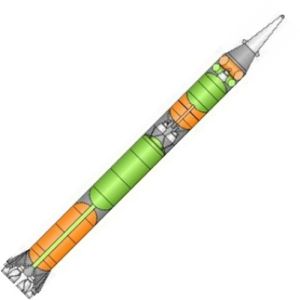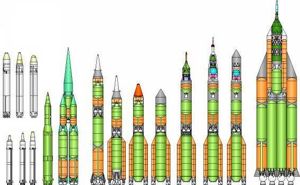
Home - Search - Browse - Alphabetic Index: 0- 1- 2- 3- 4- 5- 6- 7- 8- 9
A- B- C- D- E- F- G- H- I- J- K- L- M- N- O- P- Q- R- S- T- U- V- W- X- Y- Z
Monoblock UR-500
Status: Design 1962. Payload: 12,000 kg (26,000 lb). Thrust: 8,119.80 kN (1,825,404 lbf). Gross mass: 543,400 kg (1,197,900 lb). Height: 54.00 m (177.00 ft). Diameter: 6.20 m (20.30 ft). Apogee: 200 km (120 mi).
This variant was studied by Chelomei's Filial Number 1, Chief Designer V N Bugayskiy, under the lead engineer M S Mishetyan.
The design mass and engine performance figures for this version have been given. The calculated payload is 12,000 kg (26,000 lb) to a 200 km orbit.
Stage Data - Monoblock UR-500
- Stage 1. 1 x UR-500 Monoblok Stage 1M. Gross Mass: 367,360 kg (809,890 lb). Empty Mass: 25,560 kg (56,350 lb). Thrust (vac): 8,989.700 kN (2,020,965 lbf). Isp: 310 sec. Burn time: 115 sec. Isp(sl): 280 sec. Diameter: 6.20 m (20.30 ft). Span: 6.20 m (20.30 ft). Length: 30.00 m (98.00 ft). Propellants: N2O4/UDMH. No Engines: 4. Engine: 8D43 + 11D43. Status: Study 1962. Comments: Original conventional 'Monoblock' design for Proton first stage.
- Stage 2. 1 x UR-500 Stage 2. Gross Mass: 137,700 kg (303,500 lb). Empty Mass: 16,000 kg (35,000 lb). Thrust (vac): 3,183.200 kN (715,612 lbf). Isp: 320 sec. Burn time: 119 sec. Diameter: 4.10 m (13.40 ft). Span: 4.10 m (13.40 ft). Length: 10.90 m (35.70 ft). Propellants: N2O4/UDMH. No Engines: 4. Engine: RD-0213. Status: Study 1962. Comments: Original Proton second stage design.
- Stage 3. 1 x UR-500 Stage 3. Gross Mass: 23,940 kg (52,770 lb). Empty Mass: 2,180 kg (4,800 lb). Thrust (vac): 613.110 kN (137,833 lbf). Isp: 320 sec. Burn time: 110 sec. Diameter: 4.10 m (13.40 ft). Span: 4.10 m (13.40 ft). Length: 3.70 m (12.10 ft). Propellants: N2O4/UDMH. No Engines: 1. Engine: RD-0212. Status: Study 1962. Comments: Original Proton third stage design.
Family: orbital launch vehicle. Country: Russia. Engines: 8D43 + 11D43, RD-0212, RD-0213, 11D43, 8D43. Stages: Monoblock UR-500-1M, Monoblock UR-500-2, Monoblock UR-500-3. Agency: Chelomei bureau.
Back to top of page
Home - Search - Browse - Alphabetic Index: 0- 1- 2- 3- 4- 5- 6- 7- 8- 9
A- B- C- D- E- F- G- H- I- J- K- L- M- N- O- P- Q- R- S- T- U- V- W- X- Y- Z
© 1997-2019 Mark Wade - Contact
© / Conditions for Use

